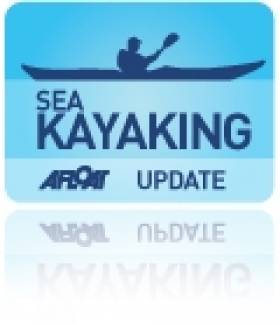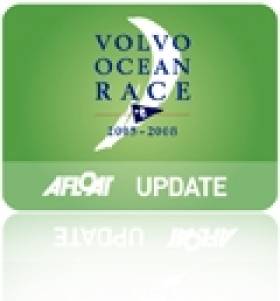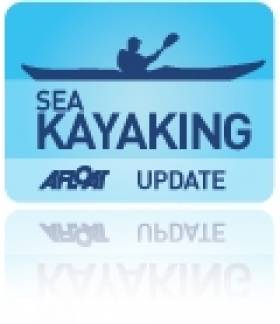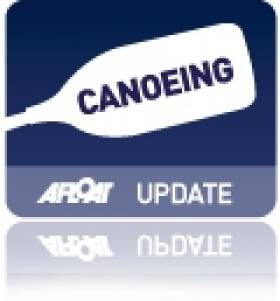Displaying items by tag: sea kayaking
Corkman Completes Round-Ireland Solo Sea Kayak Challenge
#SEA KAYAKING - It was a lucky Friday the 13th for Cork adventurer Mike Jones who returned to an enthusiastic reception on completing his solo circumnavigation of Ireland by kayak after 40 days at sea.
As previously reported on Afloat.ie, Jones set out from Cobh on Monday 4 June in an 18-foot sea kayak with the aim of completing the charity challenge in under five weeks.
Unfortunately the tumultuous weather of the past few weeks put paid to those plans, but as he told the Cork Independent, he "wasn't that far off" the 35-day mark.
"The weather was of course very bad and it was a battle for the first few days of it," he added. "The longest day for me was crossing Donegal Bay up north where I was kayaking for about 17 hours which was pretty tiring."
Despite the rough conditions, Jones was well prepared for any and all eventualities, even using a VHF radio to keep in regular contact with the Irish Coast Guard and carrying a GPS tracker so visitors to his blog could track his daily progress.
And considering his pedigree as an open-water rower - he became one of the first Cork men to row across the Atlantic Ocean in 2010 - Jones was more than able for the job.
But he also admitted that the kindness he received from strangers was pivotal to his successful effort, which has so far raised almost €3,500 for the Children's Sunshine Home and LauraLynn House for children with life-limiting conditions.
The Cork Independent has more on the story HERE.
#TRY BOATING – As well as the Round the World Racers on show at the Volvo Ocean Race 2011- 2012 Grand Finale in Galway (30th June to 8th July 2012) there's also a chance to get on the water have a try at Sailing, Windsurfing, Paddle Boarding, Sea kayaking and Water Polo.
Get on board a Galway Hooker, Donegal Drondheim, Achill Yawl and Arab Dhow. See what it's like on board a modern racer cruiser. Accessible sailing for those with restricted mobility are also catered for.
Volvo Youth Academy
• Try Sailing on a Ludic 18 foot sailing dinghy with an experienced local sailor in a safe environment. Just visit the Race village any day 1100 to 1700 and book a place. Free age 10+.
• Website www.volvooceanracegalway.com
Ocean Youth Trust
• Try Sailing on a RS Elite 18 foot sailing keel boat with an experienced local sailor in a safe environment. Just visit the Race village from Wednesday 4th July 1100 to 1900 and book a place. Free age 12+.
• More information from Bronagh Cappa-Campbell email [email protected] telephone 00442890453062. Website www.oyti.org
Galway Bay Sailing Club
• Try Sailing on a Vision 16 foot sailing dinghy with an experienced local sailor in a safe environment. Just visit the Race village any day 1100 to 1700 and book a place. Free Age 10+.
• Tried the sailing want to take the helm then the Taste of Sailing is for you. Then book a place on the half day Taste of Sailing Course and get your Irish Sailing Association certificate.
• Morning and Afternoon Sessions aged 10+.
• Multiple half days can be booked to make up a longer course.
• Take the helm and learn to sail on the 12 foot RS Feva double handed dinghy either on the waters of Lough Atalia or off the beach at the Galway Ocean Sports Club.
• Cost €10 per half day session booking in advanced from Thomas Mills 087 7754514.
• Email [email protected] website www.gbsc.ie or at the Race Village.
Bow Waves
• Try Sailing on a Laser 16 foot sailing dinghy with an experienced local sailor in a safe environment. Just visit the Race village any day 1100 to 1700 and book a place. Free Age 10+.
• Tried the sailing want to take the helm then the Taste of Sailing is for you. The book a place on the half day Taste of Sailing Course and get your Irish Sailing Association (ISA) certificate.
o Morning and Afternoon Sessions aged 10+.
o Multiple half days can be booked to make up a longer course.
o Take the helm and learn to sail on the 12 foot Topper Topaz double handed dinghy either on the waters of Lough Atalia or off the beach at the Galway Ocean Sports Club.
o Cost €10 per half day session booking in advanced by telephone 091560560 or 0878077177.
o Email [email protected] website www.bowwaves.com or at the Race Village
Accessible Sailing
• Sailing session for people with disabilities.
• The Irish Disabled Sailing Association, ISA, GBSC and Even Keel have teamed up to bring a fleet of 7 boats which will cater for different needs.
• Morning and Afternoon Sessions. Free aged 8+.
• Booking in advance by Email [email protected] by telephone 0878800744. Websites www.sailforce.ie, www.sailing.ie, www.gbsc.ie and www.theevenkeel.com
Galway Hooker Association
• Get on board a traditional Galway Hooker to get to know the ropes from the sheets and the canvas from the blocs.
• On the Quay side all week.
• More information from Padraic de Bhaldraithe email [email protected] or telephone 0876591904. Website www.galwayhookerassociation.ie
Rusheen Bay Windsurfing
You prefer to do some sailing standing up the Taste of Windsurfing is for you. Then book a place on the half day Taste of Windsurfing and get your Irish Sailing Association certificate RBW.
o Afternoon sessions weekends and evening Sessions all week.
o Multiple half days can be booked to make up a longer course.
o Stand up and sail on safe waters of Rusheen bay aged 12+.
o Cost €20 per half day session booking in advanced from Danny Mulryan 0862605702.
o Email [email protected] website www.rusheenbay.com or at the Race Village.
Try Sea Kayaking with Burren Outdoor Education Centre and Kayakmor
If you prefer going for a paddle then explore the shore line from the docks to Hare Island in a sea Kayak.
• Morning and Afternoon Sessions with Burren Outdoor Education Centre
o Fee €5 aged 10+ at the Race Village.
o More information from Joanna McInerney 087 2229459
o Email [email protected] website www.burrenoec.com
• Evening Sessions
o Fee €5 aged 10+ at the Race Village.
o More information from Jim Morryissey 087 7565578
o Email [email protected] website www.kayakmor.com
Puma Stand Up Paddle Boarding
You can now go padding standing up Puma are bringing their latest carbon fibre boards for you to try.
• All day sessions aged 12+ free.
• Off the prom at Palmers Rock Salthill.
• More information from Mark Paaluhi of Puma on 00- 310-927-1288
• Email [email protected] website www.puma.com
Corrib Water Polo and Swim Club Try Water Polo
I f you really want to play ball and get up to your neck in water have a go at the try water polo session.
• Wednesday 4th July 1730, aged 15 and under free.
• Must be able to swim a width.
• Kingfisher Club NUIG
• More information from Andy Flanagan
• Email [email protected]
Duo Set for Sea Kayaking Challenge off Western Scotland
#SEA KAYAKING - Brit duo Andy Pearson and Paul A'bear will embark on a 500-mile sea kayaking voyage along Scotland's west coast this summer in aid of charity.
Canoe & Kayak UK reports that the pair will set out from the Solway Firth near the Scottish border at the end of June on the expedition that will take them through the Irish Sea to the Atlantic Ocean.
The adventure will see them paddle through "wild, stormy seas" and "some of the strongest tidal currents in the world".
Pearson and A'bear, who have been friends since primary school, hope to raise at least £1,000 for Cancer Research UK.
For more details on their adventure visit www.westcoastchallenge2012.co.uk.
The Sea Road Casts Off With Trip to Saltee Islands
The first in a new series, The Sea Road, following classic Irish sea kayaking routes in The Irish Times takes Gary Quinn to the Saltee Islands.
Setting out from Kilmore Quay in Co Wexford in a group of seven, the forecast of four four winds with rain, fog and thunderstorms is concerning, but not enough to hold Quinn back. And when they finally pierce the fog to land on Little Saltee, it's all worth it.
"The fog lifts, the sun breaks through and, stepping up off the beach, a carpet of bluebells appears to bloom, almost before our eyes," writes Quinn.
The Irish Times has more on Gary Quinn's Saltee Islands visit HERE.
































































